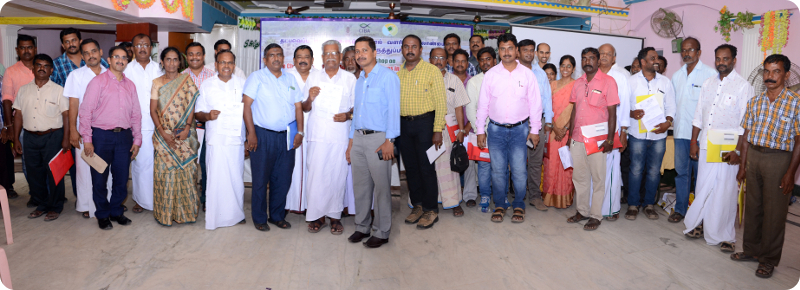ICAR-Central Institute of Brackishwater Aquaculture organized Training workshop – cum – Aquaculture Health Camp on Climate Change Impacts and Adaptation Measures in Brackishwater Aquaculture at Ramanathapuram, Tamil Nadu on 28th September 2016 under the support of “National Innovations in Climate Resilient Aquaculture (NICRA). Dr.M. Muralidhar, Principal Scientist & SIC, Environment Section and PI, NICRA Project welcomed the gathering on behalf of Director of The Institute, Dr. K.K. Vijayan, and explained about the objective of the programme. The programme is focused on the increasing understanding of climate change impacts on aquaculture and aquaculture vulnerability in the coastal brackish water areas, to develop possible strategies to enhance the capacity building and adaptive capacity of aqua-farmers and develop policies for climate resilient aquaculture; increased awareness on the extreme climate events damage to brackishwater aquaculture. Thiru M.Kasinatahapandian, Deputy Director of Fisheries, Ramanathapuram in his Chief Guest address, emphasised the importance of licensing for shrimp aqua farms in order to get insurance in the event of extreme climatic events and Fisheries Department’ help to the farmers on this aspect. Dr C. S. Shine Kumar, Deputy Director, Export Office, MPEDA, Tuticorin during the felicitation address advised the farmers not to report on any diseases incidence in the farms without scientific validation.
At the workshop with shrimp farmers of the region, Scientists team from Aquatic Animal Health & Environment Division (AAHED), provided on-farm testing service. Water, soil and animal samples were collected from 40 farmer’s ponds in Ramanathapuram District and analysed water quality parameters viz., pH, salinity, total hardness, calcium, magnesium, carbonate, bicarbonate, total alkalinity, turbidity, total ammonia nitrogen, nitrite nitrogen; soil redox potential; surveillance of white spot disease (WSD) and Enterocytozoon hepatopenaei (EHP) using PCR-DNA test at free of cost. This has given the holistic picture about the water quality, pond bottom condition and health status of the aquatic animals of the district. About 85 farmers from the area participated in the Workshop. Pamphlets in vernacular language on soil and water quality management for shrimp culture, application of minerals in shrimp culture, soil redox potential an indicator of pond bottom condition, water probiotics, management of diseases such as WSD, EHP, acute hepatopancreatic necrosis disease (AHPND) were distributed to the farmers for creating awareness. During the technical session, Dr.M.Jayanyhi, Dr.M.Kumaran, Dr.R.Saraswathy and Dr.M.Makesh Principal Scientists; Dr.K.P.Kumaraguruvasagam, Senior Scientist; and Dr.N.Lalitha and Satheesha Avunje, Scientists of the Institute made presentations on the topics, ‘climate change impacts and production risks in vannamei shrimp farming and adaptation measures’. Analysis reports on the samples from farmers were discussed and distributed to the farmers. During the interaction session, Scientists from the Institute clarified the queries of the farmers on soil redox potential, management of ammonia and nitrite levels in the ponds, control of Enterocytozoon hepatopenaei (EHP) and WSD, seed quality, seed testing, establishment of lab facility, subsidy during disasters of heavy rain, and insurance. The portable instruments used for the on-farm testing were displayed during the meeting, to provide firsthand information to farmers on the testing and diagnostic process and interpretations.
[Best_Wordpress_Gallery id=”43″ gal_title=”Aquaculture Health Camp , Ramanathapuram”]
